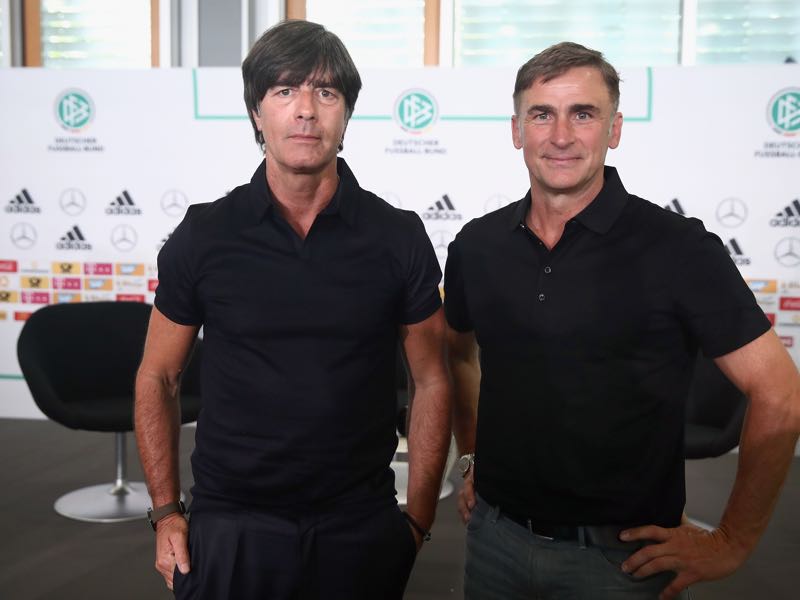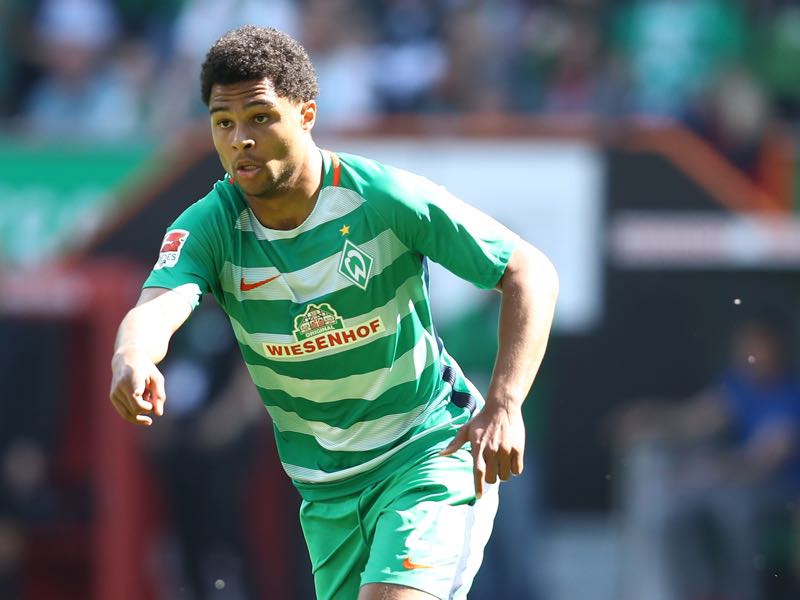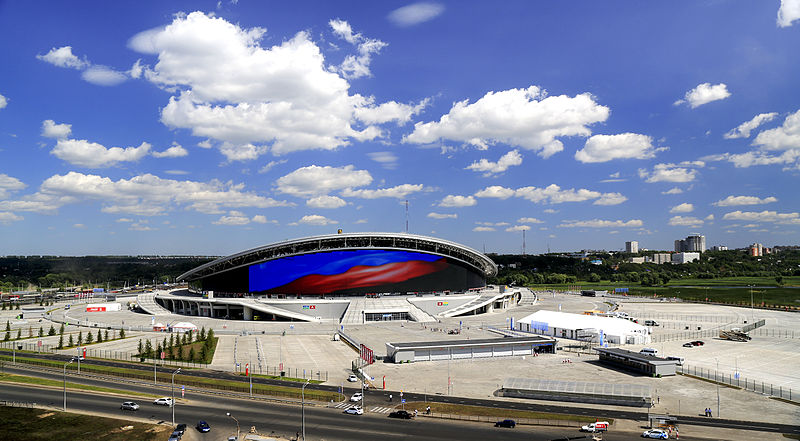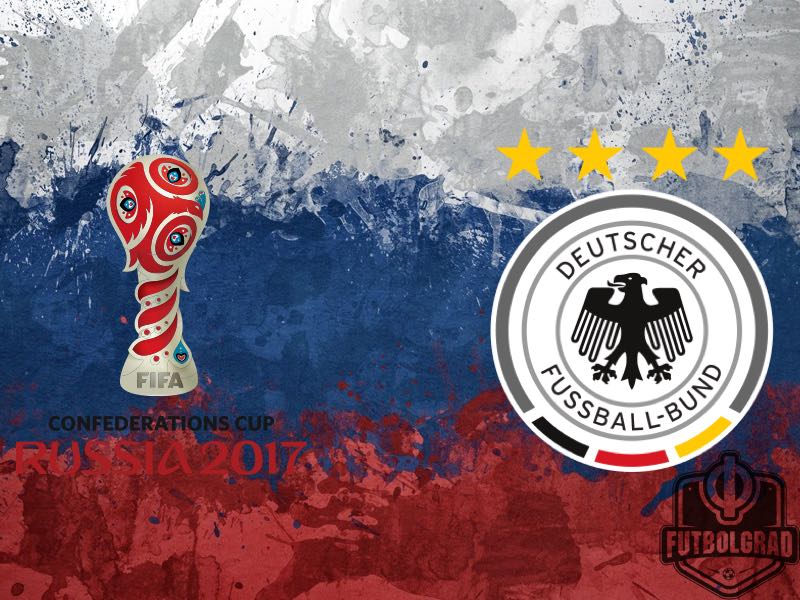Manuel Veth –
Germany will be travelling to the 2017 FIFA Confederations Cup in Russia as the current World Champion. This will be the third time that die Mannschaft will be participating at the FIFA Confederations Cup. Germany took part in the 1999 version in Mexico, where they were eliminated in the group stage, and then hosted the event in 2005, where they finished third. Having won the 2014 World Cup in Brazil, Germany would on paper be considered as the hands-down favourite to win the tournament.
Die Mannschaft, however, will be taking a very experimental squad to Russia this summer. Germany’s head coach Joachim Löw has chosen to rest several key players for this tournament and die Mannschaft will, therefore, travel to the Russian Federation without the likes of Mesut Özil, Thomas Müller, Manuel Neuer, Jérôme Boateng and Marco Reus, who will all be rested for the tournament.

Joachim Löw (l.) and Stefan Kuntz announced the Germany squads for the Confederations Cup and U-21 European Championships at a press conference on May 17. (Photo by Alex Grimm/Bongarts/Getty Images)
For head coach Joachim Löw, in fact, the tournament in Russia is just a stepping-stone towards defending the World Cup trophy next year. Furthermore, the DFB also highly values the U-21 European Championships that will take place in Poland this summer at almost the same time than the FIFA Confederations Cup. As a result, Joachim Löw announced the Germany squad for the tournament in Russia together with U-21 head coach Stefan Kuntz as the two had to find a small balance over how to distribute Germany armada of young talented players in the two squads.
Players like Serge Gnabry, Jonathan Tah, Max Meyer, Maximilian Arnold, Mahmoud Dahoud and Mitchell Weiser, who are all going to participate in the U-21 tournament, could have all featured prominently in Löw’s plans this summer. At the same time, Germany is very aware that the U-21 that won the 2009 European Championships later formed the backbone of the squad that won the 2014 World Cup in Brazil.

Super talent Serge Gnabry has been delegated to the U-21 squad this summer.(Photo by Oliver Hardt/Bongarts/Getty Images)
Winning a tournament like the U-21 European Championship installs a mentality of success. The FIFA Confederations Cup in the meantime is simply considered a test run for the big show the following year, and very few players consider winning Confederations Cup as a significant achievement in their careers.
Germany will now begin their preparations for this tournament with a friendly against Denmark on Tuesday, June 6 in Copenhagen and then play their World Cup qualifier against San Marino in Nuremberg on June 10. After that Löw will give his players some free time before the national team will travel to Russia to kick off the tournament against Australia on June 19 at the Fisht Olympic Stadium in Sochi.
Germany – Opponents
Germany are placed in Group B together with Australia, Cameroon and Chile. As mentioned above die Mannschaft will kick off the tournament on June 19 in Sochi. The first game, in particular, will be the first major logistical challenge for Joachim Löw’s staff. Located on the border to Abkhazia Sochi is known for its sub-tropical temperatures, which could give a slight edge to Australia. But despite the fact that Germany is sending a B-Squad to the tournament there should be more than enough quality in the team to defeat Australia, particularly since die Mannschaft demonstrated in Brazil that they are accomplished of adapting to the challenges of having to travel fast distances in various climate zones. Up next will be Chile on June 22 in Kazan.

Travelling between Kazan and Sochi will provide Germany with a major logistical challenge. (Image by Stanislavgubaydullin CC-BY-SA-3.0)
Chile and the travel, Kazan is located in the Republic of Tatarstan Kazan, which is located 2000 kilometres north of Sochi, will be Germany’s toughest opponents on matchday 2. Unlike Germany, Chile have decided to take their full squad to the tournament and with the likes of Alexis Sanchez and Arturo Vidal in the squad could be more than a match for an inexperienced German side. Following the match against Chile Germany will be travelling back to Sochi to face Africa’s champion Cameroon. Here Germany should be the favourite, but it will be interesting to see how the team will adapt from travelling back and forward between Sochi and Kazan in the span of just six days.
Germany – What to Expect
Aside from New Zealand, Germany are perhaps the biggest surprise package of the tournament. The squad nominated by Joachim Löw has never played together, and only a couple of the players in the team are expected to make the World Cup squad for next summer. That said the Olympic Tournament, which the country finished second, last summer highlighted that Germany are more than capable of forming a competitive squad even with relatively unknown players. Young stars like Julian Brandt, Serge Gnabry, and Niklas Süle used last summer’s tournament to play themselves into the notebooks of big clubs, but also become serious alternatives for the German first team. Hence, while the current squad lacks the big name potential, there is no reason to believe that Germany could not challenge for the FIFA Confederations crown this summer.
Germany – Squad
Goalkeepers: Bernd Leno (Bayer Leverkusen), Marc-Andre ter Stegen (Barcelona), Kevin Trapp (PSG)
Defenders: Matthias Ginter (Borussia Dortmund), Jonas Hector (1.FC Köln), Benjamin Henrichs (Bayer Leverkusen), Joshua Kimmich (Bayern), Shkodran Mustafi (Arsenal), Marvin Plattenhardt (Hertha Berlin), Antonio Rüdiger (Roma), Niklas Süle (Hoffenheim)
Midfielders: Julian Draxler (PSG), Leon Goretzka (Schalke), Kerem Demirbay (Hoffenheim), Lars Stindl (Borussia Monchengladbach), Emre Can (Liverpool), Amin Younes (Ajax), Leroy Sane (Manchester City), Julian Brandt (Bayer Leverkusen), Sebastian Rudy (Hoffenheim), Diego Demme (Leipzig),
Forwards: Sandro Wagner (Hoffenheim), Timo Werner (Leipzig)
Manuel Veth is a freelance journalist and social media editor at Bundesliga.com. He is also a holder of a Doctorate of Philosophy in History from King’s College London, and his thesis is titled: “Selling the People’s Game: Football’s transition from Communism to Capitalism in the Soviet Union and its Successor States,” which will be available in print soon. Originally from Munich, Manuel has lived in Amsterdam, Kyiv, Moscow, Tbilisi, London, and currently is located in Victoria BC, Canada. Follow Manuel on Twitter @ManuelVeth.





















COMMENTS